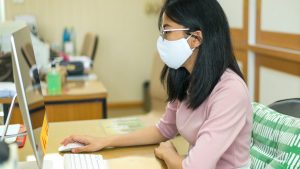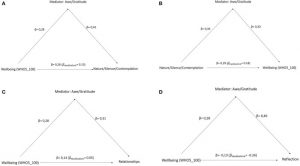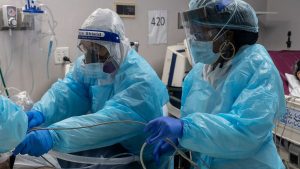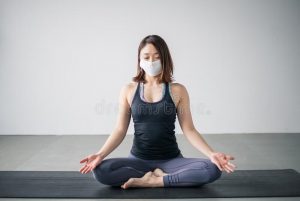Improve College Student Psychological Well-Being during Covid-19 with Mindfulness
By John M. de Castro, Ph.D.
“Mindfulness-based approaches appear well-suited to deal with the challenges presented by the time of unpresented uncertainty, change, and loss, which can take many forms in the context of COVID-19 pandemic.” – Elena Antonova
College is very stressful for students and this stress can impair the student’s physical and mental health, well-being, and school performance. Mindfulness training has been shown through extensive research to be effective in improving physical and psychological health. Indeed, these practices have been found to improve psychological health in college students. The COVID-19 pandemic has created intense stress which challenged the mental and physical health of the population. As an antidote, mindfulness is known to decrease the psychological and physical responses to stress. Indeed, mindfulness training has been shown to be helpful in coping with the mental and physical challenges resulting from the COVID-19 pandemic. So, it is likely that mindfulness training will improve the psychological well-being of college students during a Covid-19 lockdown.
In today’s Research News article “The Efficacy of a Mindfulness-Based Intervention for College Students Under Extremely Stressful Conditions.” (See summary below or view the full text of the study at: https://www.ncbi.nlm.nih.gov/pmc/articles/PMC8498086/ ) Smit and Stavrulaki recruited two classes of college students one of which was delivered 8-weekly 75-minute sessions of mindfulness training with daily home practice. During the intervention a Covid-19 lockdown was announced, and all classes moved to online delivery. They were measured before during and after the intervention for mindfulness, coronavirus worry, perceive stress, sleep difficulties, and personality.
They found that at baseline mindfulness was negatively associated with neuroticism and perceived stress while neuroticism was positively associated with sleep problems and perceived stress. They found that in comparison to the no-treatment controls and baseline, after the intervention the mindfulness trained students were significantly higher in mindfulness and significantly lower in perceived stress, coronavirus worry, and sleep problems.
It should be noted that the control condition was passive, no-treatment, and as such confounding explanations such as placebo effects, experimenter bias, attention effects etc. could explain the results. But previous controlled research has demonstrated that mindfulness training decreases sleep problems, worry and perceived stress. So, the current results are probably due to the effects of mindfulness training. The results, though, show that mindfulness training is effective in improving college students’ well-being under the extremely stressful conditions of coronavirus lockdown.
So, improve college student psychological well-being during Covid-19 with mindfulness.
“As the pandemic continues, adding to what was already an epidemic of mental health challenges, college campuses across the U.S . . . are witnessing a rise in the need and desire for meditation and mindfulness activities.” – Silma Suba
CMCS – Center for Mindfulness and Contemplative Studies
This and other Contemplative Studies posts are also available on Google+ https://plus.google.com/106784388191201299496/posts and on Twitter @MindfulResearch
Study Summary
Smit, B., & Stavrulaki, E. (2021). The Efficacy of a Mindfulness-Based Intervention for College Students Under Extremely Stressful Conditions. Mindfulness, 1–15. Advance online publication. https://doi.org/10.1007/s12671-021-01772-9
Abstract
Objectives
This study evaluates the effectiveness of a mindfulness-based intervention (MBI), called Koru mindfulness, among college students.
Methods
Undergraduate students (N = 34) participated in a 4-week mindfulness curriculum embedded within a college course, while a control group (N = 35) taking a different course did not. Notably, the intervention coincided with the start of a state-wide lockdown due to the COVID-19 pandemic.
Results
Despite the additional external stress, there was a significant main effect and a significant interaction between the intervention and time for state mindfulness, (the treatment group experienced increased state mindfulness). There was a significant main effect (higher for the control group) on coronavirus worry and a significant interaction between the intervention and time for perceived stress, with the treatment/control group experiencing decreased/increased stress over time. There was also a significant interaction between the intervention and time for sleep problems with the intervention group experiencing declines in sleep problems over time and also being more likely to experience optimal amounts of sleep over time.
Conclusions
The Koru intervention effectively increased state mindfulness, decreased stress, and improved sleep, suggesting that it is robust even under extremely stressful conditions. This study adds to the growing evidence that MBIs can play an important role in addressing rising concerns regarding the mental health of college students.
https://www.ncbi.nlm.nih.gov/pmc/articles/PMC8498086/









